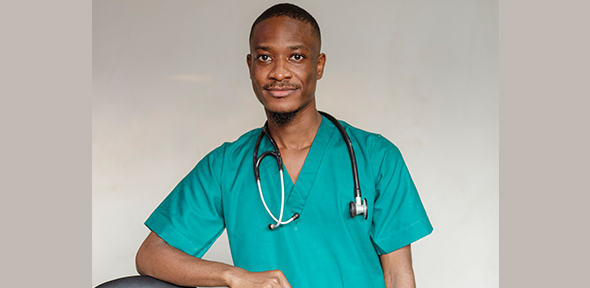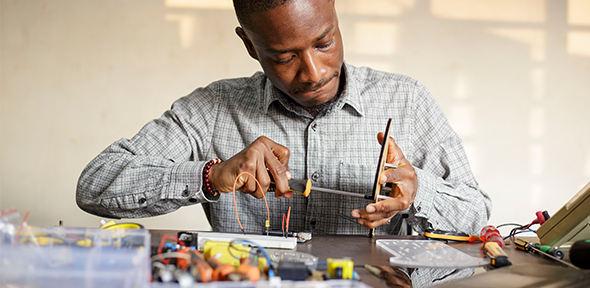
From a young age, Yaw Ansong Snr taught himself how to program computers and this sparked his love for engineering. As he prepares to begin a PhD in the Department’s Bionic Systems Group this October, we caught up with Yaw to reflect on his successes to date and to find out more about his forthcoming research in neurotechnology.
Overall, my journey has required an incredible amount of self-discipline, perseverance and fortitude.
Yaw Ansong Snr
I am Ghanaian and I have lived the majority of my life in Ghana. When I was a little boy, my mum got me a computer as a gift (quite interesting in retrospect, considering my mum is not tech-savvy). This is what fuelled my love for engineering. I taught myself how to program computers and as a child, I enjoyed building computer games and apps with my childhood start-up. Albeit a hobbyist, I managed to make money from them.
Along the way, I became interested in medicine and thought of combining the best of both worlds. I firmly believe innovation is in the intersection, thus, one of my core goals has been to leverage technology to improve health outcomes in society. Unfortunately, in Ghana, intercalated Doctorate of Medicine and of Philosophy (MD–PhD) programmes are non-existent. This means, anyone interested in becoming a physician-scientist must first finish one, then the other; making for a longer duration of study. They must also be prepared to teach themselves many things. This has pretty much been my journey. I studied for my Bachelor of Medicine and Bachelor of Surgery (Mb ChB) at the University of Cape Coast.

Yaw in his doctor scrubs. Credit: Yaw Ansong Snr
I am very excited to be joining the Bionic Systems Group, which was highly recommended to me by PhD students in the neurotech community. I reached out to the Principal Investigator Dr Christopher Proctor, because my research interest in minimally invasive implants and electronic drug delivery aligns with his. I revel the opportunity to work with him. He has been incredibly helpful and accommodating. It makes me eager to start my PhD, as I was primarily looking for an enabling environment that would challenge me to grow as an entrepreneur as well as a scientist. I am very thankful to have been selected as one of five PhD scholarship recipients, awarded by the Cambridge Trust via Cambridge-Africa, for the 2021 academic year, as well as a recipient of the Honorary Trinity-Henry Barlow award from Trinity College.
My PhD research will be on neurotech for primary treatment of the spinal cord following injury. The goal is to explore a new, clinically translatable treatment modality for Spinal Cord Injuries (SCIs). Research has shown that electric field can guide neural growth and migration. On this premise, as well as other evidenced based knowledge, the goal is to build an implantable device that would aid in the regeneration of nerve tissues. This is potentially promising because it aims at functional recovery and not just improving quality of life following SCIs. There are many factors to consider, from choosing the type of material to use, to the appropriate fabrication method, to control systems. It is an exciting area to research.
Choosing to study neurotechnology was a very easy decision – the cross-disciplinary nature of neurotech makes it the perfect field. I found ‘traditional’ bioengineering courses to be quite boring and I wanted an exciting engineering discipline that would potentially make use of all the skill set I had acquired over the years.

Yaw during the building of a rigid robot. Credit: Yaw Ansong Snr
I am also a serial entrepreneur with a soft robotics start-up, the goal of which is to explore the potential of this technology to solve interesting healthcare problems for the greater good of society. I began working on the start-up following my Master’s degree in Biomedical Engineering (Neurotechnology) at Imperial College London. There are many practical use cases for soft robotics in healthcare. During my degree, I was fortunate to be introduced to soft robotics by a kind professor I had approached for advice on a thesis topic. I fell in love with soft robotics and ended up building a soft-robotic peristaltic device that leveraged pneumatic actuation for my thesis. The degree programme also afforded me the opportunity to learn a bit more about rigid robotics via the Human Neuromechanical Control and Learning module.
Overall, my journey has required an incredible amount of self-discipline, perseverance and fortitude. For anyone interested in applying to Cambridge, I would encourage you to do so, because you miss 100% of the shots you do not take. I chose Cambridge because I find the research work, particularly at the Department of Engineering, to be cutting edge and very intriguing. In addition, Silicon Fen as well as the incubator programme at the University of Cambridge, provides the perfect environment that I seek as an entrepreneur. Finally, Cambridge-Africa’s goal of prioritising research in Sub-Saharan Africa gives me a soft spot for the University.

